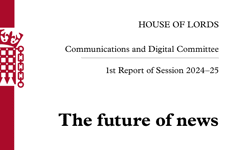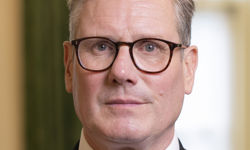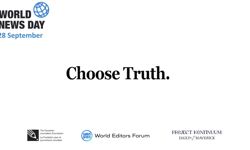The National Union of Journalists' submission:
“The British policing model is based on consent. For this to work, the public needs to have confidence in its police. The media plays a vital role as a watchdog and in holding the police to account so the public can have this confidence. This is only possible when there is an open and collaborative relationship between the police and the media.”
As well as representing journalists, the NUJ also has members who are press officers working for the police. The union has a set of ethical guidelines for all PR and communications workers. The submission included contributions from experienced national and local journalists and senior police press officers.
The union challenged the guideline stating that in most cases communication between the police and journalists must go through press officers or police corporation communications departments (CCDs). This could severely hinder a journalist working on a tight deadline. As one CCD member admitted: “The practical effect is that CCD-authorised briefings of journalists are often significantly delayed and information will not reach reporters until after deadline.”
Journalists must be able to speak to officers to obtain and share information, to check tip offs and a reporters’ investigative work; as one member noted, sometimes journalists are ahead of the police in an investigation. Restricting communication to CCDs, said the submission, would do little to aid “open, honest and transparent communications which enhance confidence in policing”.
The union backed Hayley Court, a media officer working for South Yorkshire police during the 2016 Hillsborough inquest. She said she was “bullied” into spinning for the police rather than being allowed to respond to the inquiry’s findings fairly.
Iain McBride, a former print, radio and TV journalist who was head of media for Kent Police, says he believes there has been a fundamental shift in the way police media teams are structured and how they handle external relations with journalists. He said:
“Years ago, police press offices were staffed by officers, then they were ‘professionalised’ and journalists were brought in. They understood how the real media world worked and that led, in my view, to fruitful working relationships where both sides understood the unwritten ground rules.
“Now police press officers seem to come increasingly from a PR/marketing background and their sole interest is positive promotion, rather than constructively handling the negative stories/critical incidents.”
For the most part, particularly on local newspapers, the crime reporter will have a good relationship with his/her local force. This relationship will be based on trust. It is in the interest of both sides to share information. That is why the union disagrees that journalists must sign for embargoed information. What evidence is there that press and broadcasters bust embargoes? Those who do soon find they are not trusted again.
The NUJ liaises with the police when there are demonstrations and events where our members will be working and the union has produced a video to explain to police officers the importance of adhering to the official guidelines in dealing with news gatherers.
However, there is also a long history of mistrust between the police and journalists. The NUJ is taking legal action on behalf of six of its members who discovered their lawful journalistic and union activities were being monitored and recorded by the Metropolitan Police. Officers have misused powers under the Regulation of Investigatory Powers Act to gain access to communications and bypass judicial scrutiny of requests for journalists’ material and have used production orders to seize journalists’ films.
These actions undermine a sacrosanct tenet of journalism, enshrined in the NUJ code of conduct – the protection of sources. Journalists can also have their safety severely compromised if they are perceived as information gatherers or police informants during demonstrations or civil unrest.
The union has proposed special emphasis should be given to the part of the union guideline which says: “There are no powers prohibiting reporting or filming at the scene of an incident, provided it is conducted from a public place. Police have no power or moral responsibility to stop the filming or photographing of incidents or police personnel.... Once an image has been recorded, the police have no power to seize equipment, or delete or confiscate images or footage without a court order.”
As part of the union’s evidence to the Leveson Inquiry into the culture, practices and ethics of the British press, examples of obstruction included the case of Stephen Clarke who was arrested on suspicion of taking pictures of sewer-gratings in Manchester. Although the police could not find any photos of sewer-gratings on his phone, he was held on suspicion of planning an act of terror and imprisoned for two days while the police searched his home, his phone and his computer. BBC photographer Jeff Overs was stopped and searched while he took sunset photographs of St Paul’s Cathedral.
The NUJ has called for Part Two of the Leveson Inquiry, intended to investigate the relationship between News International and other news organisations, and the police, to go ahead as promised, despite indications that the government intends to shelve it.
The guidelines say very little about social media, which has transformed the exchange of information, and make it vital that journalists are able to verify tweets from the public about events and incidents. One police insider told the NUJ there was a drive among some forces to concentrate on social media as a means to bypass the press because “social media allows police to control the inputs and content” and is preferred for “getting the police message out”. This would appear to conflict with any notion of accountability.
Michelle Stanistreet, NUJ general secretary, said: “The police and the media need to have an open relationship based on trust; our justice system depends on this. While there are many positive statements in these guidelines that the NUJ can support, it still seems to be the case that the police ‘bunker attitude’ prevails when it comes to being fully accountable. Journalists must have the right to challenge the police, the behaviour of police and how they conduct their operations.
“The union looks forward to the conclusion of the consultation on these guidelines and hopes to maintain an open and honest dialogue with the College of Policing, so we are able to discuss issues of mutual interest and engage constructively over the difficult areas of police/media communications.”












